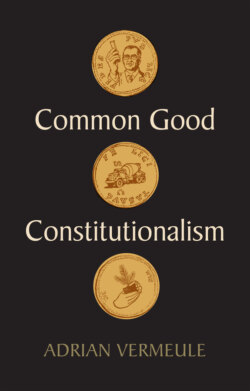Читать книгу Common Good Constitutionalism - Adrian Vermeule - Страница 12
The Role of Prudence
ОглавлениеThe common good, on this view, is a type of justification for public action. It does not, by itself, prescribe any particular legal institutions or rules. Leaving aside cases of intrinsic evils, which place deontological side constraints on all public and private action, the common good must be applied to a set of particular circumstances by means of the faculty of prudential judgment – more specifically, the virtue that is called “regnative prudence.”20 This is the prudential judgment, oriented toward justice, of a public authority who is charged with the care of the res publica, whether by election, delegation, or some other mode of selection. This prudence is by no means unstructured discretion. It is given shape by an account of the ends for which discretion must be used, that of promoting the good of the whole community as a community – not merely as an aggregation of individual preferences. In other words, discretion may never transgress the intrinsic limitations of legal justice. The obligation of the public authority is to act according to law, meaning that the public authority must act through rational ordinances oriented to the common good.
Of course, nothing in the nature of law guarantees, or could possibly guarantee, that the public authority will in fact always act for the common good. But that is true whatever theory of law we hold; it is to demand too much of law that it exclude the possibility of bad or even tyrannical government. Rather every polity must work out for itself institutional forms and customs that orient public authority toward the common good, at least roughly and on the whole. Legal theory as such, by its nature, necessarily assumes that the prevailing order is at least not wholly tyrannical.
